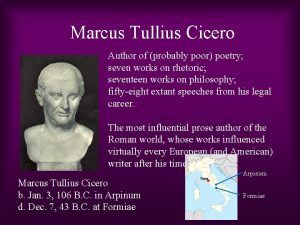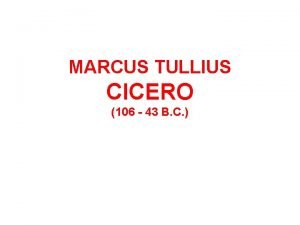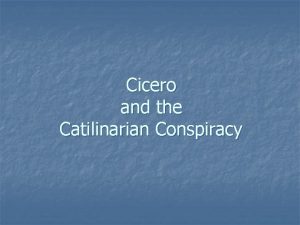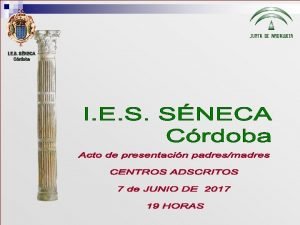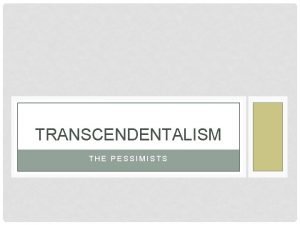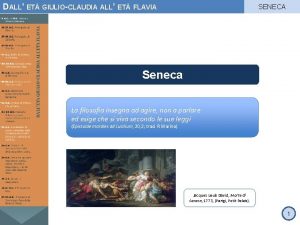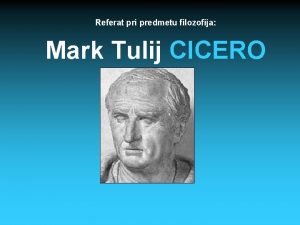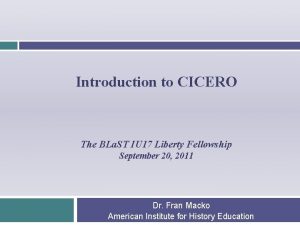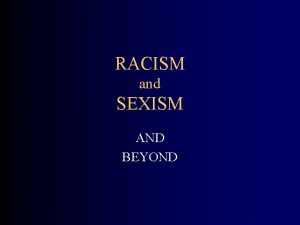Cicero aggreydarkoh 1 Introduction Cicero and Seneca wrote






























- Slides: 30

Cicero aggreydarkoh 1

Introduction Cicero and Seneca wrote during the period of the Roman Empire. The Romans had just begun to consolidate their rule. They sought to define citizenship and identify the rights and duties of citizens. The Romans believed that they were the royals and should be given special or preferential treatment. The existence of the church was also a case in point. They considered the possibility of the church maintaining its sacrosanct nature. The Roman Catholic Church was the only universal church. There also existed secular authorities which demanded loyalty and obedience from the entire citizenry. aggreydarkoh 2

Introduction (cont’d) The secular writers derived comfort from the following: The belief that the world is the creation of divine God who is reasonable and good and stands in relation to human beings as a father relates to his children. The belief that all human beings are brothers and sisters of one another, and belong to a common human family and possess common sense, i. e. common way of thinking. This makes him akin to God. Although men speak different languages and behave differently, they descended from a common source and should be each others keeper The belief that men are fundamentally social in nature, i. e. no man is completely self-sufficient. For full life, men live in complementary relationships- give as you take and take as you give. This is different from Aristotle’s famous statement that “man is by nature a political animal”. Cicero and Seneca were the most prominent writers of the time. aggreydarkoh 3

Background of the Stoics The most representative and influential philosophical school of the five centuries from about 300 B. C to A. D. 200 was Stoicism. Cicero and Seneca existed side by side with the stoics. Stoicism as a school of thought was durable, cosmopolitan, and diverse (Mc. Donald 1968: 72). It lasted from Zeno, who was born in the fourth century B. C. , to at least Marcus Aurelius who died in the second century A. D. Stoicism was founded by Zeno (336 -264 B. C). Zeno settled in Athens and opened a school to deliver lectures on philosophy and related disciplines. aggreydarkoh 4

Background of the Stoics (cont’d) Zeno was a native of Cyprus and most of the members of the stoic school were non-Greeks and two of the representative figures were slaves. The history of stoicism is divided into three periods. These are; the early stoicism, middle stoicism and late Roman Stoicism. Zeno was the leader of early Stoicism. The middle Stoicism was led by Panaetius The Roman Stoicism was led by Epictetus and Aurelius. Stoics believed that the world was determined by necessity and that there is no point in human’s fighting necessity. All that humans can do is to confront it calmly. Stoicism is the belief that man must be capable of self-control and great endurance without complaint. aggreydarkoh 5

Principles of Stoicism The Stoics philosophers had certain principles. These included the following: universal brotherhood. They argued that to a greater or lesser degree reason resides in all men and because nature is everywhere the same, all men, according to the Stoics, are citizens of the cosmopolis, or universal society. This idea of universal brotherhood to a very large extent mitigated some of the harshness that men should be brought together in brotherly affection. Even birds come together to form colonies, ‘as it were, love associations’ aggreydarkoh 6

Principles of Stoicism (cont’d) The belief in universal brotherhood was not, however, a belief in cheery good feelings toward all fellow men. The social reserve of the Stoic could not easily be broken down. The Stoics also believed in self-sufficiency. The fact that the Stoic belief in universal brotherhood and the equality of all men was in constant tension with some of their other beliefs, namely the worth of self-sufficiency, resignation to the world, a disciplined will that could ignore suffering, freedom as internal control, and the nobility of suicide. aggreydarkoh 7

Principles of Stoicism (cont’d) One other important principle of the Stoics is duty. Duty is often thought of as a primary Stoic virtue and the central link between Stoic philosophy and politics. One must accept without complaint the duties appropriate to what one is- a man, a son, a brother, or perchance, a councilor of a city, - for fate has decreed what one shall be. aggreydarkoh 8

Political Philosophy of the Stoics The whole cosmos constitute the central theme of the Stoic philosophy including political philosophy. live according to nature means to work with it towards the harmony and orderliness that is inherent in it. Man must according to reason, that is, according to the principle of nature. The conduct and behavior of man are determined by the law of the universe and all other creatures are subject to the same law. aggreydarkoh 9

Political Philosophy of the Stoics (cont’d) Reason dictates that man should pursue virtue and should not be guided by self-interests. Civil society according to the Stoics is based on the natural bonds of men. Man, in the scheme of things of the Stoics, is part of a single group or “herd”. Since all men are the same, there cannot be separate laws or principles. The Stoics wanted to set up a united and unified human society. aggreydarkoh 10

Political Philosophy of the Stoics (cont’d) The Stoics also believed in the deitification of kingship and the creation of the notion of a world city. Stoics abolished the differences among the individuals and on the other hand established the harmony between the states. aggreydarkoh 11

Marcus Tullius Cicero’ Political Philosophy (106 -43 BC) Cicero is the best-remembered Roman lawyer. He does not quite qualify as a Stoic philosopher, for he was too skeptical about the gods, but as an avowed eclectic he was a reflector of Stoic ideas. However, his fame as a writer and orator and his representative Roman confidence in law as an object of allegiance make him worthy of attention. aggreydarkoh 12

Cicero’s Political Philosophy (cont’d) Cicero was born near Arpinum, between Rome and Naples. Cicero studied law in Rome and Philosophy in Athens. He mastered the art of oratory with unusual adeptness. He also visited other Greek centers of learning. He owed his philosophical learning and outlook to Plato and Aristotle and these two philosophers exerted profound influence upon Cicero’s thought system. aggreydarkoh 13

The works of Cicero The two works of Cicero, The Republic and the Laws were titles he borrowed from Plato. There were, however, some differences in thought between Cicero, Aristotle and Plato. While Plato and Aristotle roamed in the imaginary world, Cicero came down to the real world. Cicero contemplated of a world-city and of Roman Empire, Plato and Aristotle limited their thought within the four walls of city-state. aggreydarkoh 14

The works of Cicero (cont’d) Although the thought of a world-city, he did not rule out self-government and liberty Cicero was a practicing lawyer, an experienced administrator and a fighting statesman. Justice and common good are the summum bonum of the ideal state. Only the philosopher king, according to Plato, could ensure these two objectives through his sacrifice. Cicero, on the other hand, does not touch these philosophic principles at all. aggreydarkoh 15

Cicero’s Political Philosophy The body of Cicero’s political philosophy is composed of three related elements. These are a belief in natural law, natural equality and the state as natural to man. The Belief in natural Law To Cicero, the state is the creation of law and not a moral or ethical construction. There must be a universal of law nature arising equally from the fact of God’s providential government of the world. aggreydarkoh 16

Cicero’s Political Philosophy (cont’d) He argued that the universal law of nature binds all men together. Law of Nature constitutes the foundation of the world-city. The law is supreme and therefore no one can violate it. True law is right reason in agreement with nature; it has universal applicability, unchanging, and everlasting. It summons to duty by its commands and averts from wrong doing by its prohibitions. The only way we can promote justice in the state is by showing obligation to the law of nature. aggreydarkoh 17

Cicero’s Political Philosophy (cont’d) If the laws do not conform to the laws of nature then citizens may be compelled by superior force to obey them, even though they are not under any obligation to obey them. Such laws “no more deserve to be called laws than the rules a band of robbers might pass in their assembly”. aggreydarkoh 18

Cicero’s Political Philosophy (cont’d) Natural Equality He also accepted the assertion that the world was created by somebody and that all human beings are by nature interdependent. men are born for justice and that right is based not upon man’s opinion but upon nature. There is no difference between man and man in kind. . They have common features, common feelings etc. Carlyle has said that no change in political theory is as startling in its completeness as the change from Aristotle to the notion of natural equality by Cicero. All human beings came from a common source and are thus equal. He insists that nobody has the power to enact a law which breaches the conception of the world state. All men were created by God and they are born for justice. If this is granted, then one can argue plausibly that discrimination is not only unjust but also immoral. It is the duty of every political society therefore to ensure a certain amount of dignity to every individual. aggreydarkoh 19

Natural Equality (cont’d) Even though he believes that all men are equal in reasoning faculties, he contends that there must be inequalities in certain skills. It is experience which makes the difference. Experience here includes exposure and interest. He asserts that “all men and all races of men possess the same kinds of experience and are equal and capable of discriminating between right and wrong”. Cicero also refused the time-old idea of slavery. He contends that slaves are neither tools nor properties, they are human beings and so they have the right to just treatment and independent personality. aggreydarkoh 20

The State as natural to man He argues forcefully that the state cannot exist permanently unless it depends upon and acknowledges and gives effect to the consciousness of mutual obligation and mutual recognition of rights that bind its citizens together. The state sometimes resembles a moral community, i. e. a group of persons who in common possess the state and its laws. He called the state Respublicameaning the affairs of the people. He also refers to the state as a commonwealth which he insists is the property of the people. aggreydarkoh 21

State as natural to man (cont’d) It is the assemblage of people in large numbers associated in an agreement with respect to justice and a partnership for common good. The state is necessary not because of the weakness of individuals but the existence of a certain social spirit which nature has implanted in man. Man is therefore not naturally solitary or unsocial creature. Justice of law is a means to ensure a mutual relationship in a state. The law is good only when it satisfies the people. The state is a form of a harmonious relationship between the people. aggreydarkoh 22

Cicero’s concept of Ideal state The purpose of Cicero in the Republic is to set forth a conception of an ideal state as Plato had done in his Republic. He has not made any attempt to conceal his indebtedness to Plato. He has adopted the same technique of dialogue. But Cicero’s state is not an imaginary organization. It is confined to Roman state and he has cited illustrations from the history of Rome. aggreydarkoh 23

Cicero’s concept of Ideal state (cont’d) Commonwealth is the property of the people. He maintains that the state is a corporate entity. Three consequences follow from this. These are: 1. First, since the state and its laws is the common property of all the people, its authority arises from the collective power of the people. 2. Secondly, political power when rightfully and lawfully exercised is in fact the corporate power of the people. The magistrate who exercises it does so by virtue of his office. His warrant is the law and he is himself the creature of the law. He argues that “for as the law governs the magistrate, so the magistrate governs the people and it can truly be said that the magistrate is the speaking law and the law is the silent magistrate”. aggreydarkoh 24

Cicero’s concept of Ideal state (cont’d) Finally, the state itself and its law are always subject to the law of God or natural law (that higher rule of right which transcends human choice and intuition). Force is an accident in the nature of the state and it is justified only because is required to give effect to the principles of justice and right. Cicero asserts that a tyrant is a bitter wrong against his people. aggreydarkoh 25

Characteristics of the State Cicero identified the following features of the state: In the first place, Cicero sees the state as the affair or thing or property of the people. The state is a commonwealth for ethical purposes and if it fails in its achievement, then it is nothing. The state is also based on the agreement to share common good. Cicero also said that people have assembled together not guided by their weakness but by social nature. Man is not a solitary animal. aggreydarkoh 26

Characteristics of the State (cont’d) Secondly, the authority of the state is collective and is derived from the people especially if it is properly exercised. Finally, the state and its laws are subject to God. Force can only be used to justify or for the sake of justice and right. aggreydarkoh 27

Politics Cicero asserts the importance of politics and applauds the love for noble actions which nature has given to men that they may defend the common weal. He declared that statesmen who are able to oblige all men to follow a certain course of action by authority and the use of punishment are more worthy of esteem than teachers who influence but few. aggreydarkoh 28

Forms of government Cicero identified three forms of government. These included: Democracy He considers democracy as the “habitation of liberty” and according to its defenders, the only form of government that can be truly called a commonwealth. Yet in his view, democracies have the difficulty in maintaining equal rights and in recognizing degree of merit and therefore often degenerate into the “the irresponsible madness of the mob”. Aristocracy Aristocracies uphold the ideal of merit, but often rich men acquire power and cling to the label aristocrat after the substance is gone. aggreydarkoh 29

Forms of Government (cont’d) Tyranny : He also concedes the benefits of wise rule by one man but quickly adds that one man rule is almost always likely to lead to tyranny. In each form of government, there is the germ of corruption and instability and this leads to the fall of government. It is only a mixed form of government (a combination of all the three) which is the proper guarantee of stability and corruption-free society. He admired monarchy for the love which a king bears to his subjects, aristocracy for its wisdom in counsel, and democracy for its freedom. He argues that it is only a republican form of government which is the perfect example of checks and balances for the stability and good of the political system. aggreydarkoh 30
 Cicero seneca
Cicero seneca Caesar and cicero
Caesar and cicero Etienne dolet 5 principles of translation
Etienne dolet 5 principles of translation Five classical canons of rhetoric
Five classical canons of rhetoric Cicero poetry
Cicero poetry 106+43
106+43 Francesca cicero
Francesca cicero Hvad er ciceros pentagram
Hvad er ciceros pentagram Colton sattler
Colton sattler Materi konsep seni kelas 10
Materi konsep seni kelas 10 Umb cicero
Umb cicero Mdi sdi
Mdi sdi Gênero
Gênero Marcus tullius cicero publilia
Marcus tullius cicero publilia Cicero gif
Cicero gif Cicero catilinam denuntiat
Cicero catilinam denuntiat Cicero bibliotekssystem download
Cicero bibliotekssystem download Royal bay cicero
Royal bay cicero Lazy frog cicero
Lazy frog cicero Seneca county extension office
Seneca county extension office Seneca college hybrid
Seneca college hybrid Seneca grading scheme
Seneca grading scheme Seneca student services
Seneca student services A suffragettes home
A suffragettes home Seneca county 4-h extension office
Seneca county 4-h extension office Jac444
Jac444 Anders seneca
Anders seneca Iesseneca religion
Iesseneca religion Ict seneca
Ict seneca Hawthorne transcendentalism
Hawthorne transcendentalism Fca seneca
Fca seneca




